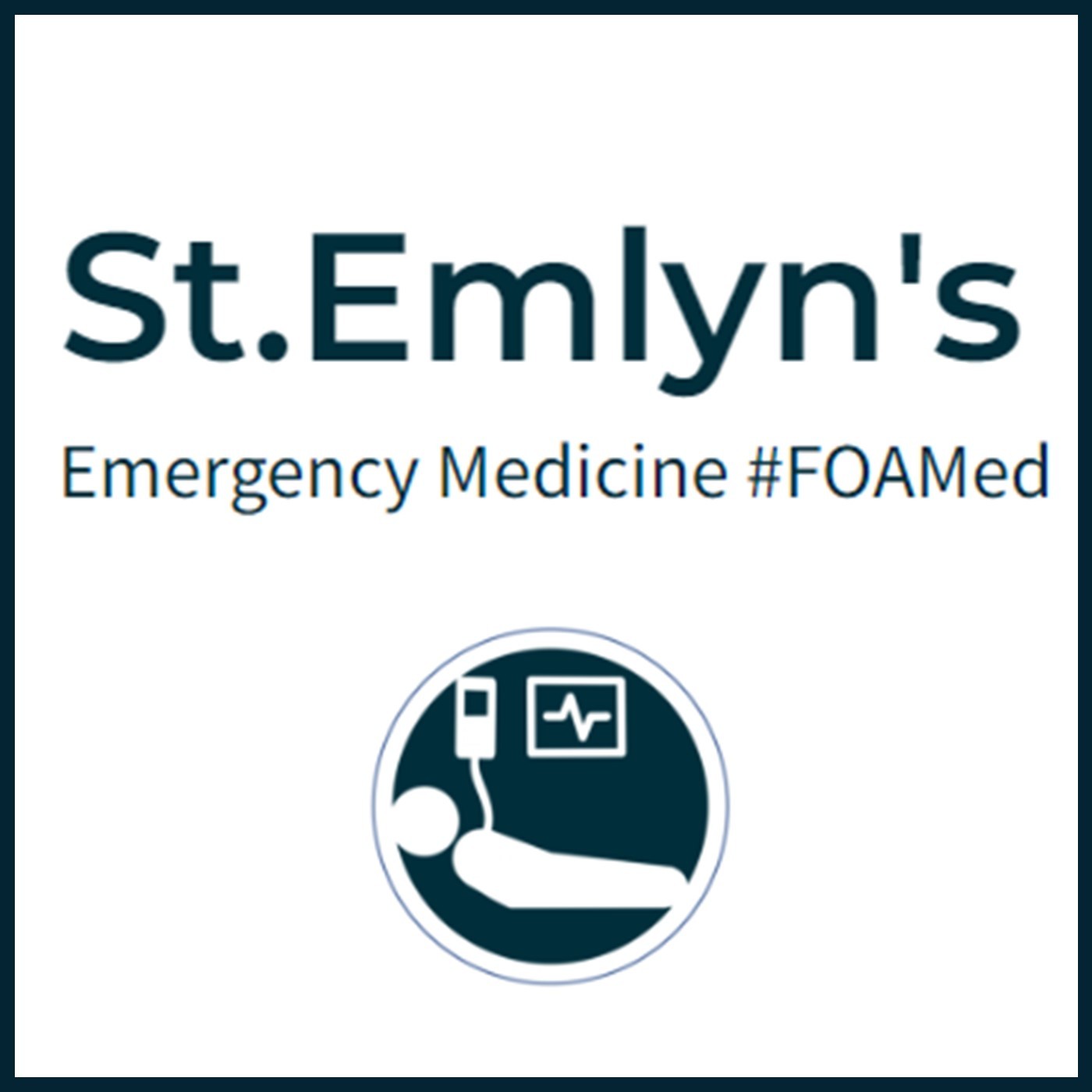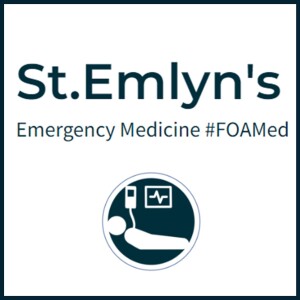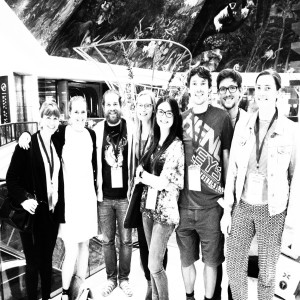
1.3M
Downloads
289
Episodes
A UK based Emergency Medicine podcast for anyone who works in emergency care. The St Emlyn ’s team are all passionate educators and clinicians who strive to bring you the best evidence based education. Our four pillars of learning are evidence-based medicine, clinical excellence, personal development and the philosophical overview of emergency care. We have a strong academic faculty and reputation for high quality education presented through multimedia platforms and articles. St Emlyn’s is a name given to a fictionalised emergency care system. This online clinical space is designed to allow clinical care to be discussed without compromising the safety or confidentiality of patients or clinicians.
A UK based Emergency Medicine podcast for anyone who works in emergency care. The St Emlyn ’s team are all passionate educators and clinicians who strive to bring you the best evidence based education. Our four pillars of learning are evidence-based medicine, clinical excellence, personal development and the philosophical overview of emergency care. We have a strong academic faculty and reputation for high quality education presented through multimedia platforms and articles. St Emlyn’s is a name given to a fictionalised emergency care system. This online clinical space is designed to allow clinical care to be discussed without compromising the safety or confidentiality of patients or clinicians.
Episodes

Saturday Oct 21, 2017
Ep 99 - October 2017 Round Up
Saturday Oct 21, 2017
Saturday Oct 21, 2017
Navigating the Landscape of Emergency Medicine: Insights from St. Emlyn's
Welcome to St. Emlyn's, your go-to resource for the latest in emergency medicine. Our recent discussions cover a range of topics, from evolving communication strategies in major incidents to the nuances of managing chronic health issues among healthcare professionals. Let's dive into key insights and updates from our blog and the recent College of Emergency Medicine conference.
Modernizing Major Incident Communication
Traditionally, emergency departments relied on landlines and telephone trees for major incident alerts. However, modern digital tools like WhatsApp, Facebook, and Twitter offer more efficient solutions. Inspired by incidents like the Manchester bombing, our recent blog post details how to set up a robust communication system using WhatsApp. This involves configuring specific alert tones and ensuring confidentiality, providing a quick and reliable way to mobilize staff during crises.
Clots and Immobilization: Current Research and Practices
Clot management, especially in the context of immobilization, remains a critical area of study. Dan Horner's work, including the Tilly study, explores whether prophylactic low molecular weight heparins should be used for patients with injuries like Achilles tendon ruptures. Current guidelines suggest a nuanced approach, advocating for patient-specific discussions based on individual risk factors for DVT. This research highlights the importance of personalized treatment and continuous guideline updates.
The Role of Ultrasound in Managing Superficial Vein Thrombosis
The management of superficial vein thrombosis (SVT) has been another focus. Using ultrasound, as Dan Horner suggests, can help assess the extent of SVTs and determine the need for anticoagulation, particularly when SVTs are near the saphenofemoral junction. This approach ensures comprehensive care and prevents complications from missed DVT diagnoses.
Global Perspectives: Insights from South Africa
Our collaboration with UK physicians working in South Africa provides a global perspective on emergency medicine. Despite resource limitations, the dedication to delivering quality care remains consistent across continents. This exchange of knowledge reinforces the universal principles of emergency medicine, emphasizing adaptability and resourcefulness.
Addressing Chronic Health Conditions in the Workplace
A guest post by Harriet, a Manchester-based emergency physician with rheumatoid arthritis, offers insights into managing chronic health issues while working in emergency medicine. Harriet's story highlights the physical demands of the job and the need for supportive workplace practices. It encourages a more inclusive approach, ensuring that all healthcare professionals can perform at their best, regardless of health challenges.
Re-Evaluating Oxygen Therapy in Acute Coronary Syndromes
Evidence-based medicine is at the heart of St. Emlyn's, and the DETO2X-AMI study has sparked significant discussion. This study suggests that supplemental oxygen may not always benefit patients with acute coronary syndromes, particularly those with normal oxygen saturation levels. This finding prompts a more tailored approach to patient care, aligning treatments with the latest evidence.
The Emergence of New Cardiac Biomarkers
Cardiac myosin-binding protein C has emerged as a promising new marker for early myocardial infarction diagnosis. However, Rick Body cautions that despite its potential, the transition from research to clinical practice involves numerous hurdles. The practical application of new biomarkers requires rigorous testing and regulatory approval.
Revisiting Tetanus Management
Chris Gray's exploration of tetanus management emphasizes the need for accurate administration of vaccinations and immunoglobulin. Despite being a well-known disease, misunderstandings about treatment protocols persist. Chris's post clarifies who needs boosters and who requires immunoglobulin, ensuring patients receive appropriate care.
Lessons from Mass Casualty Incidents
Zafira Kasim’s insights from the AAST meeting highlight critical lessons from mass casualty incidents like the Florida nightclub shooting and the Boston bombings. These experiences underline the importance of preparedness and the continuous updating of major incident protocols. The blog post provides practical strategies for refining emergency response plans.
The State of Emergency Medicine in the UK
The recent College of Emergency Medicine conference in Liverpool provided a comprehensive overview of the state of the specialty in the UK. Despite challenges like burnout and systemic pressures, the conference showcased a resilient and dedicated community. Presentations highlighted the importance of mental health, resilience, and compassion in maintaining quality care. Caroline Leach’s discussion on compassion underscored the emotional journey of healthcare professionals and the need for empathy in the workplace.
The Need for More Academic Involvement
The conference also stressed the importance of increasing academic involvement in emergency medicine. The UK currently has a low number of emergency medicine professors compared to other specialties. There is a strong call to foster the next generation of academic leaders, with initiatives like new NIH positions offering opportunities for growth.
Preparing for Winter: The Upcoming Challenges
As winter approaches, emergency departments anticipate increased patient volumes and complexity. At St. Emlyn's, we emphasize resilience and preparedness, supporting healthcare professionals through these demanding times. Our aim is to provide resources and knowledge to enhance patient care and professional satisfaction.
Looking Ahead: Embracing Innovation and Community
St. Emlyn's remains committed to keeping you informed and passionate about emergency medicine. Our upcoming podcast project will further engage and update you on the latest developments. We encourage you to explore our blog for the most recent posts, research findings, and expert opinions.
In conclusion, the field of emergency medicine is both challenging and rewarding. At St. Emlyn's, we are proud to contribute to this dynamic community, supporting the ongoing professional development of our colleagues. As we navigate the complexities of modern healthcare, we remain dedicated to providing the best possible care for our patients and ensuring the well-being of our medical community. Stay connected with us for continuous updates and insights into the ever-evolving world of emergency medicine.

Friday Oct 06, 2017
Ep 98 - Life as an EM trainee in South Africa. A panel discussion
Friday Oct 06, 2017
Friday Oct 06, 2017
Exploring Emergency Medicine in South Africa: A Journey Beyond the Familiar
Introduction
Hello, and welcome to the St. Emlyn's podcast. I'm Simon Carley, and today, I'm sharing insights from a fascinating experience at the Emergency Medicine Society of South Africa (EMSSA) conference in Sunsetty, Johannesburg. The vibrant city became a backdrop for an enriching exploration into the challenges and rewards of practicing emergency medicine in a vastly different healthcare environment.
This blog post builds on Robert Lloyd's impactful blog about his tough yet enlightening experience at Khayelitsha Hospital. Our journey takes us through candid conversations with UK emergency medicine trainees currently working in South Africa. These discussions reveal not only the clinical and emotional challenges they face but also the profound personal growth they experience.
The Appeal of South African Emergency Medicine
Our conversation begins with a roundtable introduction. Each trainee shares their background and reasons for embarking on this journey. Jen, known as Coffee Headaches on Twitter, is currently working at Khayelitsha Hospital outside Cape Town, having moved from London. Chris and Chloe, both F4s, are working in Benedictine Hospital, Nongoma, and in Malawi, respectively. Sam, Jen's partner, is also at Khayelitsha, while Emma and Jacob, both F5s, are experiencing South African healthcare from different vantage points.
The primary motivation for these trainees to come to South Africa is to gain exposure to cases they rarely see in the UK. This includes a high prevalence of infectious diseases and trauma cases, providing a rich learning environment. The desire to challenge themselves and see how they react in a high-pressure environment is a compelling draw.
Realities of Practicing in South Africa
The conversation quickly shifts to the realities of working in this challenging environment. Despite extensive preparation, the reality of dealing with penetrating trauma, community assaults, and other interpersonal violence in South Africa is stark. As described by Jen and Chris, it's like managing a major incident every weekend night, with a constant flow of young male patients suffering from multiple stab wounds, often brought in by friends or local EMS.
The lack of resources and the necessity to make do with what's available forces a departure from UK-standard protocols. For instance, performing chest drains without the usual monitoring or resources becomes a norm. This scenario is a mental and emotional challenge, as it requires adapting to an environment where the ideal care isn't always possible.
Mental and Emotional Challenges
One of the key discussion points is the mental toll of practising in such a different environment. The trainees express that the most stressful aspect is not being able to provide the level of care they are accustomed to in the UK. The overwhelming number of patients and the lack of resources mean they must often prioritize care based on immediate necessity rather than best practice. This situation requires them to accept that they can't always do everything they would like to, a reality that is difficult to reconcile with their training.
Yet, they also speak of the incredible support network among South African doctors. These professionals guide the UK trainees, helping them navigate the practical challenges and the emotional landscape of emergency medicine in South Africa. This mentorship is invaluable, offering a buffer against the intense stress of the environment.
Unique Clinical Skills and Adaptations
The blog also delves into the unique clinical skills gained in South Africa. Many procedures and techniques, such as the Joburg knot for chest drains, are tailored to the local context, where resources are limited, and patients often face harsher post-treatment conditions. The trainees note that while these methods may not always align with UK standards, they are practical and effective in the South African context.
Moreover, they discuss the necessity of quick decision-making and improvisation. With patients often arriving in critical condition and space at a premium, immediate action is needed, often in less-than-ideal conditions. This experience contrasts sharply with the UK, where procedures are typically performed with more resources and time.
The Emotional Highs and Lows
Despite the challenges, the trainees describe the experience as overwhelmingly positive. The highs of successfully managing complex cases and the lows of resource limitations create a unique learning environment. The exposure to severe trauma cases, particularly penetrating injuries, has significantly reduced their anxiety about these scenarios. This newfound confidence is something they plan to bring back to their practice in the UK.
The trainees also express deep admiration for their South African colleagues, who demonstrate remarkable skill and resilience in a resource-limited setting. The ability of these professionals to provide high-quality care despite significant challenges is both inspiring and humbling.
Recommendations for Future Trainees
As the discussion winds down, the trainees share advice for others considering similar experiences. They emphasize the importance of understanding the expectations and conditions of the placement. The experiences can vary widely depending on whether one ends up in a well-supported trauma unit in a city or a rural hospital with minimal resources and support.
They recommend a minimum stay of three months to truly understand and contribute effectively to the healthcare setting. Shorter stays, they argue, don't provide enough time to adapt to the environment or make a meaningful impact.
Conclusion
Our conversation concludes with a reflection on the broader implications of this experience. The trainees agree that the skills and resilience developed in South Africa are not only invaluable but also applicable to emergency medicine practice in the UK. The experience underscores the need for adaptability, resourcefulness, and a deep understanding of the human aspects of healthcare.
South Africa, with its unique challenges and vibrant culture, offers an unparalleled learning experience for emergency medicine trainees. The personal and professional growth that comes from working in such a diverse and demanding environment is immense. As the trainees prepare to return to the UK, they carry with them not only new clinical skills but also a deeper understanding of themselves as clinicians.
This experience has been a powerful reminder that the essence of emergency medicine transcends geographical and cultural boundaries. It's about providing the best possible care under any circumstances, a lesson that resonates deeply with the core values of St. Emlyn's.
If you're considering a similar journey, take the plunge. The highs and lows are part of a journey that will not only shape your medical career but also broaden your perspective on healthcare and humanity. As we say goodbye to South Africa, the stories and lessons from this experience will undoubtedly inspire and inform the future of emergency medicine practice, both in the UK and beyond.
